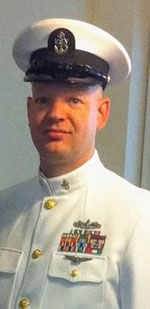Eryck Stamper, Baltimore, Maryland
Eryck Stamper had no question about his career path. Military service is the family business. His parents, uncles, grandfather and great grandfather had served in the armed forces. When he committed at age 18 to join the U.S. Navy, he did a shot with his recruiter and his mother at the bar where she worked.
 Eryck Stamper had no question about his career path. Military service is the family business. His parents, uncles, grandfather and great grandfather had served in the armed forces. When he committed at age 18 to join the U.S. Navy, he did a shot with his recruiter and his mother at the bar where she worked.
Eryck Stamper had no question about his career path. Military service is the family business. His parents, uncles, grandfather and great grandfather had served in the armed forces. When he committed at age 18 to join the U.S. Navy, he did a shot with his recruiter and his mother at the bar where she worked.
By the end of a distinguished 23-year career in the Navy, including multiple naval deployments in support of Desert Shield/Enduring Freedom, Somalia, and multiple relief efforts, he was coming to grips with having become “a hardcore alcoholic.”
He quit drinking the summer of 2013 and switched to cannabis as soon as he retired that October. Cannabis helped him not just stay away from alcohol but also eliminate all but one of the 8 medications he had been prescribed to cope with the various physical and psychological injuries of his service.
When he enlisted straight out of high school in 1990, Eryck started at the bottom as an E-1 Seaman Recruit, swabbing decks and standing shipboard underway watches. Over his 23 years of service, he came to embody what the Navy calls “deck-plate leadership”—working your way up but never forgetting where you came from. As he rose to the rank of E-8 Senior Chief Petty Officer with a Top-Secret/Sensitive Compartment Information security clearance, managing radio and cryptographic communications, what he learned about leadership and personnel management solidified his path.
Eryck jokes that those who served say “Navy” stands for “Never Again Volunteer Yourself,” but his military training and his experience with the healing potential of cannabis combined to lead him to an advocacy role for cannabis and veterans. His advocacy started with employment in a Maryland dispensary, where the owner, whose father was a veteran, asked Eryck what they could do to help others who had served. After thinking long and hard, Eryck proposed a discount for veterans of 22%, a number that reflects the average number of veterans who commit suicide in the U.S. each day due to PTSD. It was a 30-second decision.
After implementing that discount where he worked, Eryck turned to other businesses and organizations, advocating for not just veterans but their families and first responders. Those efforts became Veterans Initiative 22, which has in less than two years convinced 50+ organizations to offer the 22% savings and hire veterans and retired first-responders. They also persuaded five medical cannabis doctors to offer recommendations for a $22 fee.
“For years after I left the Navy, I was embarrassed to ask for my veteran’s discount,” Eryck says. “Now, it’s second nature.”
The difference is he’s not just asking for himself now. Finding the confidence to advocate for veterans and cannabis took a little time, but Eryck has always had the acceptance of his family and the support of his mother and grandmother, who was proud to see him in uniform and now is proud of his work for others.
“I learned about advocacy from Americans for Safe Access and Maryland NORML,” Eryck says. “Now I’ve got my sights set on veterans, family and first responders—the tax advantages of hiring them, the training and discipline they can bring to any organization.”
He’s also been advocating for medical cannabis and alternative holistic health approaches with the Veterans Administration (VA), the Veterans of Foreign Wars and the American Legion.
“We’ve got the support of the VFW and the Legion, and we’re working with the VA on suicide prevention and a CBD suppository for prostate health and endometriosis,” Eryck says. “But we’re still dealing with a blue line on base, forcing family members to go off base for medical cannabis.”
Eryck has just graduated from organic farm school from Therapeutic Alternatives of Maryland (TALMAR) under a Veterans Administration vocation and rehabilitation program and is focused on developing the Maryland Hemp Exchange.
“Right now, 65 farmers have been approved to grow hemp through the Maryland Department of Agriculture, and Maryland has just about 1,440 acres under cultivation,” Eryck says. “Hemp can create jobs, so our goal is to create an industrial hemp program in Maryland.
This profile was originally published in the November 2019 ASA Activist Newsletter
Share this page





















